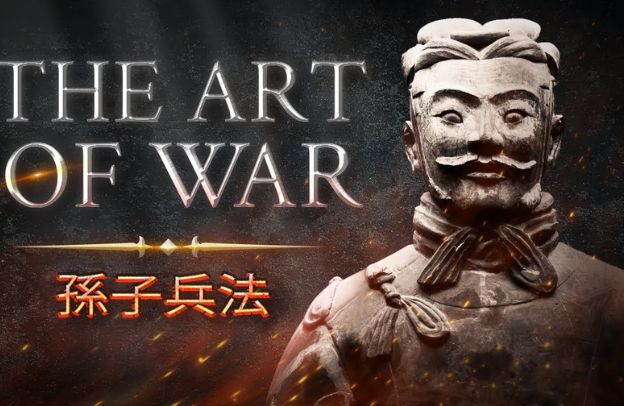5 Key Things Businesses Can Learn From The Art Of War By Sun Tzu

Welcome to book two of four important books that have had a profound impact on my personal development journey. Today’s conversation is about Sun Tzu’s “The Art of War” a classic treatise on strategy and warfare, but its principles can be easily applied to various aspects of life, including business.
Want to learn more about storytelling? Start by downloading the first chapter of The Storytelling Series for Small Businesses.
These lessons from the book encourage businesses to think strategically, adapt to change, and understand their environment. It equally encourages businesses to lead effectively and leverages creative tactics to gain an advantage in the competitive marketplace.
I assume you have read this book so you can better understand the following five valuable lessons businesses can learn from Sun Tzu’s teachings:
1. Strategy and Planning:
Sun Tzu emphasizes the importance of careful planning and strategy. In business, this means setting clear objectives, understanding your competition, and developing a well-thought-out plan for achieving your goals. A well-crafted strategy can help a business navigate challenges and opportunities more effectively. Consider the following two examples:
Know Your Enemy and Yourself:
Sun Tzu emphasized the importance of understanding both your own strengths and weaknesses and those of your adversary. In a business context, this means conducting a thorough analysis of your company’s capabilities and the market.
For example, a company may perform a SWOT (Strengths, Weaknesses, Opportunities, Threats) analysis to assess its internal strengths and weaknesses and external opportunities and threats.
By doing so, the company can develop a strategy that leverages its strengths and mitigates its weaknesses while exploiting market opportunities and defending against threats.
Employ Deception and Misdirection:
Yes, this too is important for business, and I will explain. Sun Tzu’s teachings also include the use of deception and misdirection as strategic tools. For businesses, this doesn’t mean being dishonest but rather being creative and innovative.
For instance, a business might use marketing campaigns that surprise and captivate customers, thereby creating a sense of excitement and anticipation. Apple, for example, is known for its secrecy and the element of surprise when unveiling new products. Doing this allows the company to create buzz and generate immense interest among its customers and the media.
By incorporating these two strategies inspired by “The Art of War,” businesses can approach strategy and planning more comprehensively and creatively. You too, in your business learn to leverage these strengths, exploit opportunities, and use inventive tactics to gain a competitive edge in your target markets.
2. Adaptability in business:
Sun Tzu advises that one should be flexible and adaptable in the face of changing circumstances. Businesses must also be agile and ready to adjust their strategies when market conditions change. Adapting to new technologies, customer preferences, and competitive threats is essential for long-term success.
Adaptability is a crucial aspect of business strategy, and “The Art of War” provides insights into how businesses can better approach this for optimal results:
Flexibility in Strategy:
Sun Tzu emphasizes the need for flexibility in response to changing circumstances. In business, this means that companies should be open to adjusting their strategies in response to market shifts.
For example, if a company’s initial product launch doesn’t gain traction in the market, it should be ready to pivot and adapt by reevaluating its product, marketing approach, or target audience.
A good example of this is how Netflix originally started as a DVD rental service and then successfully adapted by transitioning into a streaming platform when digital technology became more prevalent.
Speed and Timing:
Sun Tzu stresses the importance of timing and speed in executing strategies. In business, this relates to being responsive to market changes and acting swiftly. For instance, when a competitor launches a new product that threatens your market share, an adaptable business should respond promptly by improving its own offerings or by introducing new products that meet evolving customer needs.
The concept of “first-mover advantage” is related to this principle, where companies aim to be the first to capitalize on emerging trends and technologies.
Resource Allocation:
Sun Tzu advises that resources should be allocated wisely and following the evolving situation. In a business context, this means being willing to reallocate resources when necessary.
For example, if a certain market segment is no longer profitable, a business should be adaptable enough to reassign resources to more promising opportunities. This might involve divesting from underperforming divisions or investing more heavily in areas with growth potential.
Consider embracing these principles from “The Art of War,” and you can better approach adaptability by remaining open to change, responding quickly to market shifts, and making resource allocation decisions that correctly align with the evolving business landscape.
3. Competitive Intelligence:
As I have already stated, “The Art of War” underscores the significance of knowing both your strengths and weaknesses and those of your competitors. In business, gathering competitive intelligence is crucial.
Understanding your competitors’ strategies, products, and weaknesses can help you position your business more effectively and make informed decisions. Here are some of the possible approaches to consider:
Know Your Competitors Thoroughly:
Sun Tzu emphasizes the importance of knowing your enemy, and this concept can be applied to understanding your competitors in business. To better approach competitive intelligence, businesses should conduct in-depth research on their competitors, not only in terms of their products and services but also their strategies and weaknesses.
For example, if you are in the smartphone industry, knowing the features, pricing strategies, and market positioning of your competitors can help you create a more effective product and marketing strategy.
Gathering and Analyzing Information:
Sun Tzu suggests that knowledge is a valuable weapon. Businesses can approach competitive intelligence by actively gathering information about competitors through various means, such as market research, social media monitoring, and industry reports.
This information should be analyzed to identify trends, strengths, and weaknesses. In the same way, military leaders gather intelligence about their adversaries to make informed decisions on the battlefield, businesses must gather information to make informed decisions in the marketplace.
Exploiting Competitive Weaknesses:
Sun Tzu advises leveraging the weaknesses of your enemies. In business, this translates to finding and exploiting the vulnerabilities of your competitors.
For instance, if you identify a gap in a competitor’s product line or detect customer dissatisfaction with their customer service, you can use this information to tailor your own products or services to meet unfulfilled needs and gain a competitive advantage.
By following these principles inspired by “The Art of War,” businesses can better approach competitive intelligence. Remember what I have shared, thoroughly research competitors, actively gathering, and analyze information, and make sure to use insights to exploit weaknesses in the market.
This information can be an asset for developing effective strategies and staying ahead in a competitive environment.
4. Leadership and Management:
Sun Tzu emphasizes the role of leadership and the importance of inspiring and leading your team effectively. In the business world, strong leadership and effective management are vital. Good leaders can motivate and align their teams to achieve common goals, fostering a culture of teamwork and innovation.
Here are two ways businesses can better approach leadership and management. See how this might resonate with you:
Lead by Example and Earn Respect:
Sun Tzu stresses the importance of leading by example and earning the respect of your team. In business, this translates to effective leadership and management.
Business leaders should demonstrate the values, work ethic, and professionalism they expect from their teams. By setting a strong example, leaders can gain the respect and trust of their employees, thereby fostering a positive work environment.
Sun Tzu mentions that a general who leads by example can inspire greater loyalty and dedication from the troops.
Decisiveness and Clear Communication:
Sun Tzu highlights the significance of clear communication and decisive decision-making. In business, this means that leaders should communicate their vision and strategy clearly to their teams.
Decisiveness is essential in rapidly changing markets. Leaders should be able to make tough decisions promptly, avoiding hesitation that could lead to missed opportunities or prolonged problems. Sun Tzu discusses the importance of swift and firm decision-making, emphasizing that a leader who can make quick, well-informed decisions can outmaneuver competitors.
For example, a CEO who leads by example, works hard, and treats employees with respect can foster a positive organizational culture and gain the loyalty and admiration of their team. Similarly, a manager who communicates clearly and makes timely decisions can keep a project or team on track and respond effectively to changing circumstances.
Apply these principles in your business and you can better approach leadership and management in your organization. By so doing you will be creating a more productive and efficient work environment and ensuring that they can adapt to and overcome challenges.
5. Deception and Surprise in Business
Sun Tzu discusses the use of deception and surprise as strategic tools in warfare. In business, this doesn’t mean being dishonest but rather being creative and innovative. Developing unique marketing campaigns, introducing innovative products, and disrupting traditional markets can give a business a competitive edge.
Deception and surprise can be strategic tools in business, and “The Art of War” offers insights into how businesses can better approach these concepts. Here are two ways, along with examples from the book:
Innovative Marketing and Product Launches
Sun Tzu discusses the use of deception to confuse and surprise the enemy. In business, companies can use innovative marketing and product launches to create excitement and surprise in the market.
For example, a tech company may create anticipation and buzz around a product launch by revealing only partial information, keeping the final features and details hidden until the launch event. This element of surprise can generate excitement and capture the attention of both the media and potential customers, ultimately leading to increased interest and sales.
Disruptive Strategies
Sun Tzu’s concept of surprise can be applied to disrupt traditional markets and gain a competitive advantage. For instance, a business can disrupt an established industry by introducing a new business model or technology that changes the game.
Airbnb, for example, disrupted the traditional hotel industry by offering a platform for individuals to rent out their homes or rooms, catching the hospitality sector off guard. This disruptive approach created a significant surprise in the market and led to the company’s rapid growth.
I recommend you carefully consider the usage of these strategies, inspired by “The Art of War,” in your businesses and your business will thank you for it. This will allow you to stand out in crowded markets, gain a competitive edge, and capture the attention of customers and competitors alike.
Conclusion on 5 Key Things Businesses Can Learn From The Art Of War By Sun Tzu
In conclusion, Sun Tzu’s timeless wisdom in “The Art of War” holds valuable lessons for businesses seeking to navigate the complexities of the modern marketplace. Such principles and strategies as planning, adaptability, and competitive intelligence will help you take your business to the next level.
Also to consider from the book are good management and leadership qualities, as well as deception and surprise, all aimed at providing a robust framework for businesses to enhance operational effectiveness.
The wisdom of Sun Tzu transcends warfare but offers a blueprint for thriving in today’s competitive business environment. Embracing these principles can help companies not only survive but also thrive by outmaneuvering their competitors, seizing opportunities, and adapting to an ever-changing landscape.
In the spirit of “The Art of War,” businesses can secure a stronger foothold, gain market supremacy, and ultimately achieve their strategic objectives.
Want to learn more about storytelling? Start by downloading the first chapter of The Storytelling Series for Small Businesses.





